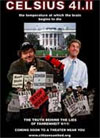Christianity Today: "[Moore] a fearmonger, preying on the ignorance of his audience"
Peter T. Chattaway reviews the film for Christianity Today:
. . . despite the occasional intriguing revelation—such as the fact that one of Bush's buddies in the National Guard, one James R. Bath, went on to be a financial advisor for the bin Laden family—the most striking thing about Fahrenheit 9/11 is not what Moore puts into the film, but what he leaves out. For example, in a montage mocking the various useless countries that joined the "coalition of the willing," such as Iceland and Morocco, Moore never mentions England or Australia. Moore also gives his viewers the impression that Iraq was a happy paradise in which children flew kites and dictators danced with their people, until that awful day when the Americans attacked; he never acknowledges the hundreds of thousands of civilians that human rights groups say were killed under Saddam Hussein's regime, nor does he address Hussein's sponsorship of terrorism in Israel or his sheltering of a key figure in the first World Trade Center attack in 1993. In fact, Moore seems to want his audience to think that Hussein posed no threat whatsoever, and in one of his more astoundingly bizarre insinuations, Moore suggests Bush attacked Iraq as a favor to his Saudi friends—but if this is so, then why did Saudi Arabia oppose the war?
And concludes:
The problem with Fahrenheit 9/11 is not that it is one-sided, per se; it is that Moore barely acknowledges there even is another side. The problem is not that he fails to give the other side equal time or equal validity; it is that he shows virtually no interest in what that other side might be, and in how he might best deal with it. Inevitably, this weakens Moore's own arguments—or it would, if he was all that concerned about making any. Moore's appeal is more emotional and visceral than intellectual; in his own way, Moore is a fearmonger, and preying on the ignorance of his audience just as he accuses Bush of doing.





|